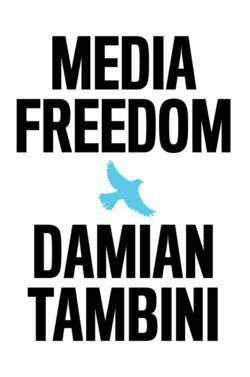Читать книгу Media Freedom - Damian Tambini - Страница 16
Information Sovereignty versus ‘Regardless of Frontiers’?
ОглавлениеThe post-war expansion of freedom of expression and free media sought to maintain open communications systems across borders as a means of preventing repression by information control. It was an attempt to lock in democracy by limiting the ability of authoritarian states to control information inputs to individual citizens. If information from outside the country was able to seep in, and if individual citizens had the right to receive ideas from sources of their choice, populations could no longer be controlled through propaganda. Hence Article 19 of the UDHR: ‘Everyone has the right to freedom of opinion and expression; this right includes freedom to hold opinions without interference and to seek, receive and impart information and ideas through any media and regardless of frontiers.’
The consensus on this model has broken down in recent years, particularly since the democratic shocks of 2016, with a growing number of experts arguing that there is a conflict between defending democratic discourse within a state and maintaining the ‘regardless of frontiers’ standard. This is because it is now widely accepted that hostile foreign actors are using ‘information warfare’ tools to exploit the new openness of increasingly internet-based amplification networks, in order to create mistrust and conflict within liberal democracies in Europe, North America and elsewhere, and to broaden divisions and social breakdown within them.77
As Western democracies examine their policy and legal frameworks in a bid to respond to disinformation, opinion is divided. The military and security establishment argues that defensive interests justify the deployment of various forms of censorship and blocking to prevent foreign interference in democracy, and laws are passed against disinformation and election manipulation.78 They point to international legal instruments that recognize national security as a legitimate reason for states to impose restrictions on media freedom.79 Others argue that a censorship response would be premature and would sacrifice the very ideals of liberty that are at stake in our defence. They advocate a reinvigorated self-regulation system and citizen-led literacy to shore up media freedom with a new purpose of responsibility. Whether this will work remains to be seen: what is clear is that the normative landscape is fundamentally altered: where once openness, freedom and deliberation were to be seen as an unalloyed good, many now argue that in order to protect democratic debate, defences are required against abuse of speech – for example, regulation of disinformation.80
Globalized communication ‘regardless of frontiers’ also undermines the unwritten codes and rules of ‘fairness’ and ‘social responsibility’81 that enabled states to maintain a ‘hands-off’ approach to the media. At the same time, migration and multiculturalism bring contrasting expectations on harmful, offensive or taboo content together spatially. The failure of agreement on how to self-regulate is revealed by the frequency with which global opinion is transfixed by yet another scandal and failure of media responsibility. The publication in Denmark of cartoons deemed offensive by Muslims leads to killings; Facebook removes a historical photograph of a naked child war victim to howls of protest at ‘privatized censorship’;82 WikiLeaks publishes thousands of secret US spy cables simultaneously on multiple global servers; a court attempts to oblige global removal of content deemed harmful in one country. All of these challenges undermine the notion of media freedom as a ‘gentleman’s agreement’, and raise questions about whether new laws need to replace fracturing ‘understandings’, and whether such a move would represent a slide towards censorship or progress towards independent regulation and due process.
In 2011 the OSCE and UN special rapporteurs on freedom of the media jointly warned of the dangers of fragmentation of the internet as sovereignty is asserted over content and personal information by national states. In the era of information warfare and data extraction, many doubt whether protection to communicate ‘regardless of frontiers’ remains a reasonable standard.83 Those that assert internet sovereignty are opposed by neo-globalists urging deeper commitment to global free communication. As Lee Bollinger put it:
We are facing the emergence of a global society, with the technological capacity to provide a free and independent press to a world in desperate need of such an institution, but there is a myriad of laws, policies, practices, and conditions that inhibit that from happening. Without a central overriding system of constitutional protections, there is a risk of collapse to the bottom, where jurisdictions that have the least degree of freedom will undermine the freedom of those that value it most.84
